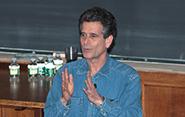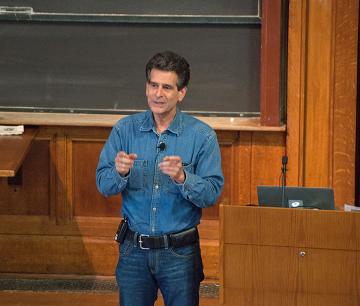Kamen speaks on making progress happen

In a time that technological breakthroughs are desperately needed, our risk-averse and underinformed culture is making innovation more difficult, famed inventor Dean Kamen told a Yale audience on April 18. The Yale School of Engineering & Applied Science hosted Kamen, the inventor of the Segway and many ground-breaking medical devices, as the 2013 Victor M. Tyler Distinguished Lecturer.
“Sadly, a lot of people confuse invention with innovation. It’s only innovation if you get it to be part of life,” Kamen told a crowd of 300 at Sheffield-Sterling-Strathcona Hall. “The barriers of ignorance and the barriers of bureaucracy are getting more daunting all the time.”
 As an example, Kamen discussed the DEKA arm, a robotic device created by his DEKA Research & Development Corporation in New Hampshire. The DEKA arm, considered the biggest breakthrough in prosthetics since World War II, allows amputees to pick up and manipulate small objects and perform many tasks unaided. Even as hundreds of Iraq and Afghanistan war veterans await prosthetics, FDA approval is still pending, Kamen said.
As an example, Kamen discussed the DEKA arm, a robotic device created by his DEKA Research & Development Corporation in New Hampshire. The DEKA arm, considered the biggest breakthrough in prosthetics since World War II, allows amputees to pick up and manipulate small objects and perform many tasks unaided. Even as hundreds of Iraq and Afghanistan war veterans await prosthetics, FDA approval is still pending, Kamen said.
“As technology is moving faster and faster, the world is getting more conservative,” Kamen said.
One of Kamen’s most ambitious recent projects, a ground-breaking water purification device, is only getting worldwide distribution due to the involvement of the Coca-Cola Company, Kamen said. NGOs are traditionally more interested in top-down water projects on a large scale – Kamen’s device is the size of a mini-fridge and can clean about 30 liters of water an hour using no more energy than required by a standard handheld hair dryer.
The world’s best hope is a rising generation of young people comfortable with technology and open to change, Kamen said. Promising young scientists and engineers in the United States should be getting as much if not more attention than promising young entertainers and athletes, he added.
To help spotlight science and engineering’s future stars, Kamen founded an organization called For Inspiration and Recognition of Science and Technology (FIRST). More than a dozen FIRST alumni currently at Yale met with Kamen earlier in the day – including Eric Dufresne, associate professor of Mechanical Engineering & Materials Science and director for Yale's Center for Engineering Innovation & Design. Dufresne was a member of the one of the first FIRST teams in Manchester, N.H. while he was in high school in the 1990’s.
Kamen’s FIRST program now reaches more than 300,000 young people a year; with its participants much more likely to attend college and purse careers in science and engineering.
“We need a generation of kids that get it, that are loud about what they get and can help persuade the rest of the world to move in the right direction,” Kamen said.

